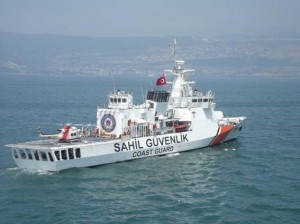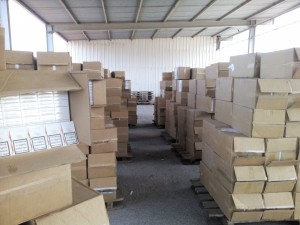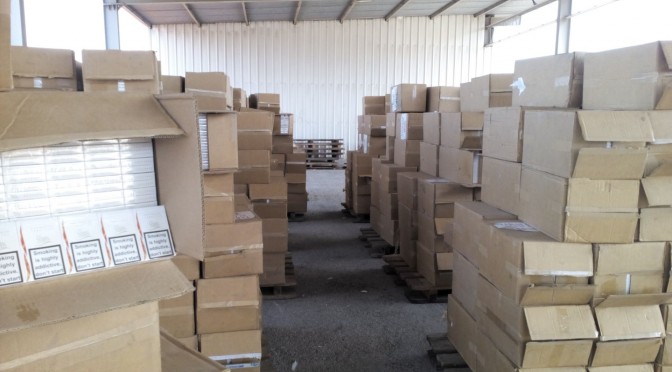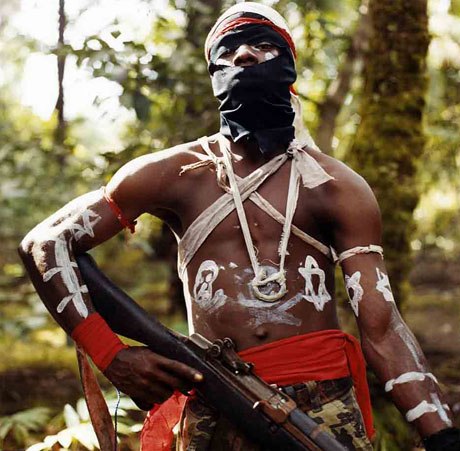This article is part of our “Border Control Week”
The sea is the circulatory system of the world economy, through which the economic blood of trade, ideas, and information flows. At odds with this healthy economic lifeblood are the pathogens of theft, corruption, and illicit trafficking. In addition to patently illegal contraband, such as narcotics and weapons, numerous illicit goods move through the maritime transportation system, avoiding taxes and undermining legitimate trade. Tobacco is one of the most commonly smuggled illicit goods around the world. The commodity moves in multiple directions, sometimes both to and from the same countries, making it challenging to understand the traffic flow. Specifically, the distribution of substandard, untaxed cigarettes through the Eastern Mediterranean involves a complex criminal network of producers, smugglers, and dealers and benefits nefarious actors across the Levant.

These substandard cigarettes are often cheaply made in Eastern Europe, circumventing European Union safety regulations. Brands such Prestige and Victory are packed aboard container ships in Bulgaria which move through the Black Sea, then into the Aegean via the Bosporus Strait. From there, some of the contraband shipments make their way to Syria, while others continue down to the Red Sea and around to the Persian Gulf. The Gulf-bound cigarettes likely continue into Iraq and Turkey. In the Eastern Med, many are offloaded at the Syrian port of Latakia. The cigarette distribution network in Western Syria is controlled by and benefits the Assad family while bypassing various international sanctions against the authoritarian regime.
Upon arrival from sea at the port of Latakia, cigarettes move through a series of storage warehouses and distribution points from Assad-controlled coastal regions of western Syria into transshipment points near the Turkish border that are sometimes controlled by smugglers aligned with the Islamic State of Syria and the Levant (ISIL). The cheap cigarettes are sold at a premium price in Syria and also smuggled across several border points into Southern Turkey. In a typical display of jihadist hypocrisy, ISIL has publicly burned shipments of cigarettes to enforce Sharia while continuing to profit from their smuggling into Turkey. The product and profit not only support ISIL and their organized crime network, but other Al-Qaeda affiliates and foreign fighters drawn to the region. The illicit tobacco trade is an instrumental part of their funding portfolio, which also includes weapons trafficking, and sale of stolen oil.
Disrupting a trade that crosses multiple sea and land borders (some of which are in war-torn countries) is challenging to say the least. Law enforcement and military organizations are incentivized to ignore or take action against illicit smuggling networks for various reasons. Clearly, customs officials in more than one jurisdiction are complicit in looking the other way or even facilitating these illegal cigarette shipments that contribute to instability in the Middle East. On the other hand, one of the more active maritime law enforcement authorities in combating the illicit tobacco trade is Turkey’s Coast Guard. In 2013, the organization seized 177,420 packs of cigarettes, down from over half a million in 2012. The organization’s deployments in the Bosphorus Strait and along the Eastern Mediterranean coastline place it in a strategic position to combat shipments moving towards Syria.

Another regional player with a demonstrated a propensity to disrupt the illicit tobacco trade is the Hellenic Coast Guard. The agency recently arrested two smugglers and seized a container full of nearly nine million contraband cigarettes at the port of Thessaloniki. Interdicting a cargo ship at sea to find a contraband cargo in one or more specific containers is extremely difficult from a tactical perspective and often unsuccessful. But intelligence sharing can assist in narrowing down the search and aiding in the removal of suspect containers as the ships make port while not disrupting the flow of legal cargo. Additional cooperation between intelligence services, private companies, and maritime law enforcement will erode the illicit cigarette trade, and reduce the profits supporting the region’s bad actors.
Chris Rawley is a Commander in the U.S. Navy Reserve with experience in maritime interdiction and counter-smuggling at the tactical and operational levels. The opinions and views expressed in this post are those of the author alone and are presented in his personal capacity. They do not necessarily represent the views of the U.S. Department of Defense or any of its agencies.


